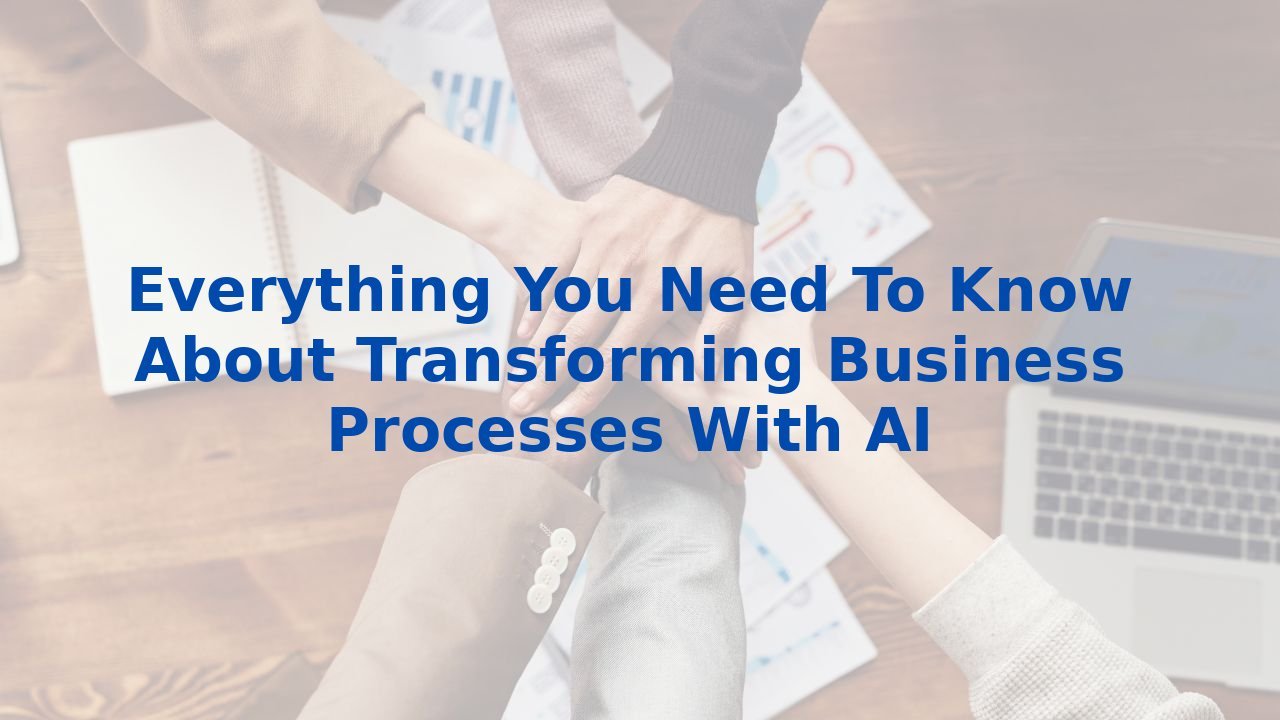Everything You Need To Know About Transforming Business Processes with AI
The Transformative Power of AI in Business Process Management
Introduction
In the ever-evolving landscape of business, the drive for efficiency and productivity has never been more pronounced. Enter artificial intelligence (AI)—a transformative force that enhances business process management (BPM) through automation, optimization, and innovation. This post will explore how AI can refine various operational processes, showcasing its potential benefits while underscoring the importance of equipping employees with the right training to harness its full capabilities.
What is AI in Business Process Management?
At its core, AI in BPM signifies the application of advanced AI technologies to design, analyze, automate, and improve processes and workflows. This integration grants organizations the ability to operate more efficiently, fostering a landscape of streamlined operations. From data analysis to process automation, the touchpoints of AI within BPM are numerous and invaluable.
Data Analysis
The power of AI lies in its capacity to analyze massive datasets with remarkable speed and precision. By organizing data efficiently, AI unveils trends, predicts outcomes, and highlights potential issues—all whilst automating tedious manual tasks. This superior analytical capability allows businesses to make informed tactical and strategic decisions and enhances overall operational integrity.
Process Building
Imagine being able to design and implement new workflows with unprecedented speed. AI offers just that, as it can create processes and workflows tailored to specific parameters set by users. This capability not only minimizes the time and effort needed to develop new processes but also empowers teams to devote their energies toward strategic initiatives that drive growth.
Automation
The mundane tasks that often bog down employees can be efficiently delegated to AI. By automating repetitive activities, such as data entry or customer service inquiries, organizations can significantly reduce the risk of error, enhance operational efficiency, and free employees to focus on value-added functions.
Applications of AI in Business Processes
HR Processes
AI revolutionizes human resources by increasing objectivity and streamlining processes. It can effectively analyze a wealth of data—performance metrics, market trends, and budgetary constraints—to facilitate more equitable salary offers. Furthermore, AI assists in recruitment by automating initial assessments, allowing HR teams to prioritize their time on strategic hiring decisions.
Sales Processes
In the realm of sales, AI acts as a catalyst for efficiency. From lead scoring to content generation for personalized emails, AI assists in optimizing the sales funnel. With predictive capabilities, AI identifies areas ripe for upsell opportunities and recommends the most effective channels for engagement, ensuring a smoother sales journey.
Customer Service
Enhancing the customer experience is paramount; AI contributes significantly to this goal by analyzing feedback for actionable insights. Incorporating chatbots allows for the handling of routine inquiries, while more complex requests are streamlined for human intervention, preserving human touch where it matters most.
Product Development
AI also paves the way for acceleration in product development, when coupled with technologies like generative design software. By identifying countless possible designs that meet specific criteria, AI reduces the time and resources traditionally spent on developing prototypes, enabling faster and more cost-effective iterations.
Benefits of AI in Business Process Management
- Improved Efficiency: The automation of repetitive tasks liberates employees, allowing them to concentrate on strategic initiatives.
- Enhanced Decision Making: AI delivers predictive recommendations drawn from historical data patterns, equipping leaders with insights for informed decision-making.
- Reduced Errors: Precision is key; AI’s automated systems minimize the chances of human error across tasks.
- Real-Time Monitoring: AI facilitates continuous monitoring of processes, empowering businesses to swiftly address potential challenges.
- Process Optimization: AI-driven insights support simulation modeling, enabling organizations to test various scenarios and refine processes accordingly.
The Importance of Employee Training
The true potential of AI is realized only when employees are adequately trained to leverage its capabilities. Without understanding AI’s possibilities, the technology's impact may remain limited. Training is essential for several key reasons:
- Understanding AI Capabilities: Education on AI’s scope empowers employees to integrate it into their workflows effectively.
- Data Interpretation: Training ensures that employees can comprehend and act upon the insights generated by AI.
- Collaboration with AI: Employees must learn to harness AI tools, blending human intuition with machine efficiency.
- Adaptability: Continuous training fosters adaptability in the workforce, paving the way for seamless adaptation to new AI-driven processes.
Investing in such training not only amplifies the effectiveness of AI within your organization but also secures a competitive edge in an increasingly digital landscape.
Conclusion
Integrating AI into business process management marks a monumental shift toward heightened operational efficiency and smarter decision-making. From automating mundane tasks to enhancing product development and revolutionizing customer service, the possibilities are limitless. As organizations embrace AI, prioritizing employee training becomes essential. By equipping your workforce with the right skills, you can fully unlock the transformative power of AI and navigate the path to sustained productivity and competitive success.



